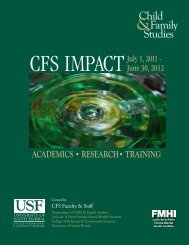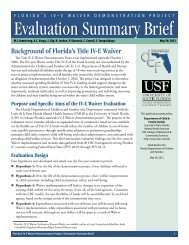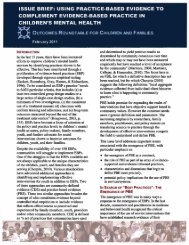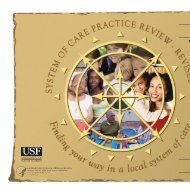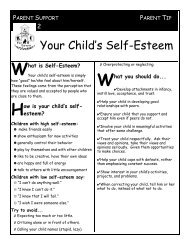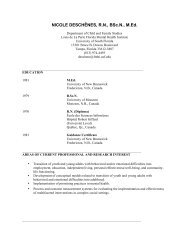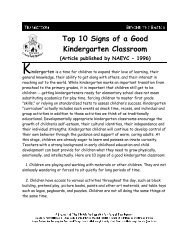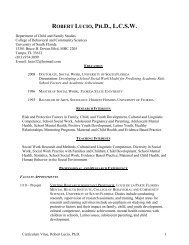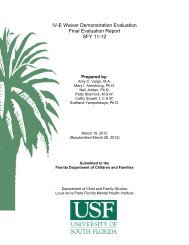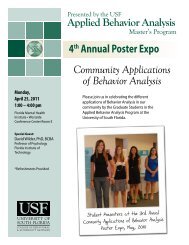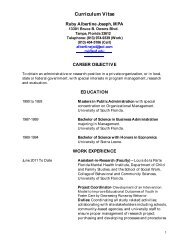The Early Learning Opportunities (ELO) Act - Child & Family Studies
The Early Learning Opportunities (ELO) Act - Child & Family Studies
The Early Learning Opportunities (ELO) Act - Child & Family Studies
Create successful ePaper yourself
Turn your PDF publications into a flip-book with our unique Google optimized e-Paper software.
Evaluation of the <strong>Early</strong> <strong>Learning</strong> <strong>Opportunities</strong> <strong>Act</strong><br />
In conclusion, <strong>ELO</strong> project goals included: creating a community of early literacy lifelong<br />
learners in the early childhood profession; implementing research-based early literacy training<br />
for early childhood education professionals; implementing a coaching model to provide a<br />
framework of professional development; increasing literacy and pre-literacy skills for children in<br />
childcare settings; developing and/or enhancing the richness of classroom/childcare home<br />
literacy environments; improving the social/emotional readiness of targeted children for<br />
classroom learning; and supporting parents as first teachers, both of literacy skills as well as<br />
healthy social-emotional development.<br />
Project partners provided in-kind resources with project activities provided as a collaborative<br />
effort coordinated by project staff. Specifically, the project provided early literacy training and<br />
coaching to teachers, childcare providers, directors and community members, and it reached<br />
children and family members with targeted literacy activities. In addition, home-based and<br />
community-based services were available to targeted families to enhance the young child’s<br />
social-emotional readiness for school. <strong>The</strong> <strong>ELO</strong> project impacted 22,687 citizens of Pinellas<br />
County with targeted and general early literacy services by establishing a framework of training,<br />
coaching, and mutual learning for participants, and organizational with commitments to continue<br />
to support the <strong>ELO</strong> project community well beyond the initial grant period.<br />
Program Evaluation Questions<br />
Nine broad questions served as the framework for evaluating the impact that<br />
implementation of the <strong>ELO</strong> grant had on participating teachers, students, and the community of<br />
Pinellas County. <strong>The</strong>se questions are contained in Table 1. A brief overview of the results as<br />
well as page references for the outcomes discussed in greater details also are included in this<br />
table.<br />
Table 1<br />
Evaluation Questions<br />
Evaluation Questions<br />
Results<br />
Page Reference<br />
1. Are LCP activities and objectives implemented in a<br />
timely fashion? Page 24<br />
2. Does the home visiting model enhance child and<br />
family outcomes? Page 27<br />
3. Does the classroom-teaching component increase<br />
knowledge and skills of child care providers? Page 28<br />
4. Does mentoring and coaching of child care providers<br />
improve their competence and confidence? Page 31<br />
5. Do participating children show improvement in skill<br />
acquisition? Page 34<br />
6. Do participating children demonstrate readiness for<br />
kindergarten? Page 40<br />
7. What are the factors associated with efficient<br />
implementation of this model in the community? Page 42<br />
8. Are families and providers satisfied with this model? Page 44<br />
9. What is the cost of implementing this model? Page 47<br />
Louis de la Parte Florida Mental Health Institute, University of South Florida – page 2



